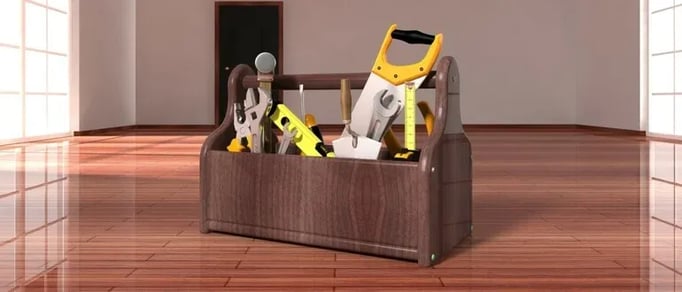4 min read
How (and why) to Provide Five Star Maintenance for Tenants
![]() David Schwartz
Aug 9, 2016 9:00:00 AM
David Schwartz
Aug 9, 2016 9:00:00 AM

Tenant demands action on neglected maintenance problems!
The above was the headline of a major story for an Alabama news station. Similar stories are routinely published around the country about mismanaged maintenance requests and subpar service. Thanks to social sharing and apartment review sites, tenants now have more opportunities to voice their complaints than ever before. So, where does this leave residential building landlords?
While it may seem frustrating, these tenants are actually doing you a favor: They're reminding you to continually maintain the value of your investment. As previously mentioned, you should ideally be striving to make incremental improvements that force appreciation year after year. Enhancing curb appeal, repairing cosmetic eyesores and raising rents were included in our suggestions for obtaining increased valuations.
Notice we said: Raising rents. Which is difficult to do without pushback if tenants are constantly complaining that maintenance isn't doing a good job to management and message boards. Fixing such problems in a timely, efficient and effective manner is simply good business AND good ethics. With that in mind, here are our top tips for building a top-notch maintenance program:
Have a Team Member Live On-Site
A major maintenance issue can leave you thousands of dollars in the hole: A burst pipe that pumps hundreds of gallons of water onto your property, leave flood damage in its wake; an electrical issue that quickly leads to a fire or a hail storm that breaks important pieces of property. Whatever the issue, a timely response can dramatically reduce overall damage.
Of course, before assigning someone to this role, you'll want to weigh the potential costs and savings. Is it cheaper to use an on-call handyman service or install a resident property manager? By including courtesy on-site rent in the job agreement, it may be a win-win for both of you.
And depending on your state, you might actually be able to avoid paying employer taxes when you offer a live-in situation. Both California and New York City, require a live-in property manager for buildings with a certain number of units (16 in California and nine in NYC). When you hire a live-in property manager to deal with maintenance and vacancies, you can avoid federal payroll taxes so long as:
- The manager lives in one of your rental properties.
- Lodging is offered for your convenience, not the employee's.
- You require the employee to live-in as a condition of employment.
Choose Contract Team Members
If you are servicing a large, multi-family building, you will need additional support beyond the person described above. Should you hire employees or contract workers? In most cases, hiring contract workers and avoiding employee taxes makes the most financial sense. As an industry standard, you should be setting aside approximately 1 percent of the property value for maintenance each year. Fannie Mae actually suggests a 2 percent holdover for maintenance. Once you've determined the type of ,maintenance team you will have, you'll want to focus on finding quality talent.
If you live in a major city, you likely have many hiring options. While finding help by word of mouth is usually the preferred option, you can also post advertisements on online job boards. The key to getting quality applicants is to a). Be highly specific on skills needed b). Give specific directions that are to be followed when submitting applications and c). Ask for references and actually follow-up with them.
The number of team members you need will depend on your acreage. The larger the community and the more spread out the buildings are, the more staff you’ll need. The age of the property and responsibilities required will also be a factor (i.e. grounds, service requests, turnover of vacancies and typical preventive work). Ideally, you'll find handy team members who enjoy a full day's worth of projects. Some landlords swear they do fine with 1 maintenance worker per 250 tenants, others suggest 1:75 is a better ratio.
Work With Outside Specialists
Another benefit of having less employees is it give you more financial leeway to hire experts and specialists who can add more value to your property. For example, you may decide to work with an online marketing specialist to help you develop a better lead generation strategy on your Website. The next quarter, you may hire a landscaper to design an attractive entrance area in an effort to impress those leads.
Or maybe you've been reading about other property owners who are saving thousands of dollars a year with water conservation methods (hint hint), and you'd like to work with The Water Scrooge. Our team compliments maintenance staffs by providing complimentary, on-site, leak inspections and courtesy toilet calibrations. Translation: If there's a leak, we'll find it!
Provide Adequate Training
Standards matter – if you have't already, consider creating a training program for maintenance team members. While such professionals will obviously bring their own expertise to the organization, there is always more than one way to do something.
Combine your own research with the knowledge of your team members to generate awesomely, efficient systems for organizing tools, completing routine tasks and maintaining grounds. Ideally, you want every process so well documented that anyone could step in and do the job if needed. Also, consider taking all new maintenance members on a property tour. Point out things that are currently up to standard and things that are not (i.e. this bathtub was properly caulked; this one needs to be redone).
Create An Organized Ticketing System
Finally, you'll want to create an organized process for dealing with tenant requests. How do the requests come in? Do they get written down or are they electronically accessible to everyone on staff? How do you prioritize requests? Does a leaky faucet come before an air conditioning issue just because it was reported first?
By creating an agreed-upon, hierarchal maintenance request tier, you and your staff will feel good your tackling problems as efficiently as possible. Also, make sure tenants know you've received their request and do give them a time-frame on when they can expect a follow-up. You'd be surprised just how big a difference that small detail can make in tenant satisfaction!
In summary, maintenance issues are probably the biggest source of contention between tenants and landlords. By hiring the right team members, smartly allocating resources and having clear systems in place, you'll create a win-win for yourself and your tenants.


